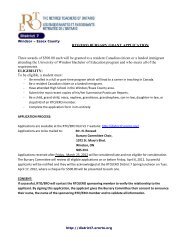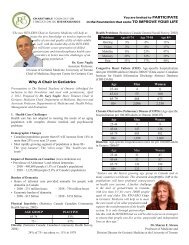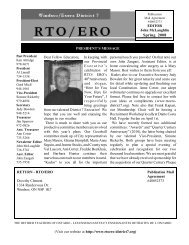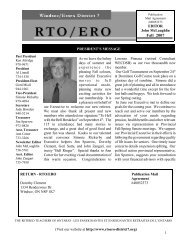Fall 2008 Newsletter - RTO/ERO District 7 Windsor-Essex
Fall 2008 Newsletter - RTO/ERO District 7 Windsor-Essex
Fall 2008 Newsletter - RTO/ERO District 7 Windsor-Essex
You also want an ePaper? Increase the reach of your titles
YUMPU automatically turns print PDFs into web optimized ePapers that Google loves.
E. ATMs or Point-of-Sale Keypads<br />
1. Thieves use tiny cameras hidden on themselves and elsewhere to spy on individuals as they input<br />
PINs at ATMs or point-of-sale keypads on checkout counters. Shield the keypad when using these.<br />
2. Try not to hand credit cards to servers who take them for processing. Pay at the cashier or insist they<br />
bring the machine to the table. Ensure cards are not swiped more than once.<br />
Thieves make duplicate passes with the cards, then steal the information to access accounts.<br />
3. PINs should be changed regularly. Personal information should not be on a card slips.<br />
F. Internet and Email<br />
1. When receiving a new computer, avoid the temptation to go online immediately. Take the time to<br />
activate, register and update the virus protection program. Many computers are compromised in the<br />
first fifteen minutes online because the operator began to browse before initiating the anti-virus<br />
program.<br />
2. Most malware is constructed to target Microsoft products (Internet Explorer and Outlook Express).<br />
Other products seem less susceptible to attack, might have superior features, and typically are no-cost<br />
items, e.g. Mozilla’s Firefox browser and Thunderbird and Google’s Gmail e-mail program.<br />
3. Those with DSL or cable high speed service, especially with wireless access, are especially vulnerable<br />
to identity thieves. Turn computers when you not using them. Protect wireless networks with<br />
passwords to protect unwanted access.<br />
4. If storing passwords electronically, consider using a removable drive with no locating information on<br />
it, instead of a hard drive. Avoid copy-and-pasting passwords. Thieves use programs which harvest<br />
data from temporary memory. Remove temporary internet files regularly.<br />
5. Online money transfer services (PayPal is one example) pose significant risks. Register only lowcredit-limit<br />
credit cards or a low-balance bank account with such a service. See “Phishing” below.<br />
6. Never click on a link then enter personal or account information. Instead, open a new browser and<br />
go directly to the company’s site and log in from there.<br />
7. Install and regularly update appropriate firewalls (free at www.zonealarm.com), anti-spyware (free at<br />
www.microsoft.com/athome/security/spyware/software/default.mspx), and virus protection (free at<br />
www.avast.com). Routinely (or automatically) check for Windows or other operating system updates<br />
and install them.<br />
8. Remember that VoiP (Voice-over-Internet Protocol) telephones can be hacked and conversations<br />
eavesdropped upon. VoiP providers can help users protect themselves against this type of potential<br />
identity theft.<br />
9. Avoid aiding and abetting spam (unsolicited junk e-mail), the mechanism by which much of online<br />
identity threats are spread. Do not forward those jokes, hoaxes, chain letters etc..forwarded to you. If<br />
an email must be forwarded, copy and paste it into a new message and send it to a specific individual.<br />
10. Avoid sending e-mail messages to entire lists unless the blind carbon copy (BCC) feature is used, so<br />
that individual email addresses are not revealed to the other recipients. Thieves love getting entire e-<br />
mail lists and compiling masses of them for sale to spammers.<br />
G. Phishing and Spoofing<br />
1. Thieves will send emails with special offers or requests for information. Often, such emails<br />
look legitimate, using exact logos and identifiers of trusted businesses. However, the<br />
legitimate businesses never ask for such information or make such offers on line.<br />
Sometimes, the tip-off to illegal activity lies in the awkward sentence structure or misspelled<br />
words of the message. Forward such messages to the legitimate website of the organization<br />
and ask for verification.







